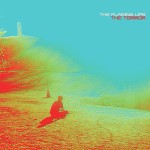A 13-minute love ballad, titled “You Lust,” that stretches back and forth from captivating melody to synthetic breakdown, separated repeatedly by an ominous whisper and finally ending with a woman’s spoken psychological confession – there’s just nothing like The Flaming Lips, for better or for worse.
“The Terror” is The Flaming Lips’ 13th studio album in a career spanning now three fully experimental decades. While nothing the band does can ever be characterized as less imaginative than another, “The Terror” marks a direction that always seemed to be coming, a concept album of nine anti-pop songs about intangible heartbreak, mystery and a whole lot of terror.
As an unmemorable Flaming Lips record, “The Terror” brings its title to life within the album, as each song bridged to the next seems to darken or dampen the gray sky the band creates with synthetic keyboard solos, short and bright guitar riffs broken by intermissions of dragging noise rock. The band’s journey deeper into the experimental genre is a noble one, but is overall incomplete, falling short of producing an extraordinary record.
From the onset of the record, frontman Wayne Coyne and the rest of the Lips penetrate their psychedelic rock with a dark ambience of guitar feedback, heavy synths and Coyne’s lo-fi vocals. At first listen, the album blends cleanly and clearly from track to track as if composed of a single song. While this approach often captures a mood of an album in different states of emotion, “The Terror” fails to provide significant variety and loses itself in creating a mood with the album.
The first track, “Look … The Sun is Rising,” begins the album on a droning note, building the atmosphere the rest of the album continually rejects, but cannot leave behind. The ominous and poorly titled opener resembles a closer theme with the second song, “Be Free, A Way,” in which a bit of sun briefly enters and then detracts. It’s a menacing convulsion of a record that battles with the desire to be alone and an anger toward that realization.
Coyne spends most of the second track, one of the album’s bright spots thematically and musically, playing with the title and the comparison of “A Way” and “Away” in an ingenious fashion that could only come from The Flaming Lips. Tracks such as “Be Free, A Way” and “You Lust” make up for most of the lackluster performance on the rest of the album.
The colorful and interesting keyboards and guitar reverb of songs such as “Try To Explain” and “Butterfly, How Long It Takes To Die” replenish the album’s task to create a record far from pop music. Unfortunately, most of the band’s obsession with experimentation falls into the tragedy of trying so hard not to make a pop album, rather than making a Flaming Lips album.
While the title track advertises itself as an apocalyptic headline, “The Terror” proves to be one of the record’s strongest tracks, with an up-tempo backbeat and atmospheric synths that allow Coyne’s strong falsetto and lyrical talents to take center stage and bring a solid, however anti-pop and disheartening, sound to a questionable record.
